
The Internet's Premier Classical Music Source
Related Links
-
J.C.F. Bach Reviews
J.S. Bach Reviews - Latest Reviews
- More Reviews
-
By Composer
-
Collections
DVD & Blu-ray
Books
Concert Reviews
Articles/Interviews
Software
Audio
Search Amazon
Recommended Links
Site News
 CD Review
CD Review
Johann Sebastian Bach
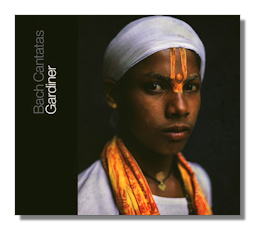
Volume 3
- Cantatas for the Fourth Sunday after Trinity
- Ein ungefärbt Gemüte, BWV 24
- Barmherziges Herze der ewigen Liebe, BWV 185
- Ich ruf zu dir, Herr Jesu Christ, BWV 177
- Cantatas for the Fifth Sunday after Trinity
- Gott ist mein König, BWV 71
- Aus der Tiefen rufe ich, Herr, zu dir, BWV 131
- Wer nur den lieben Gott lässt walten, BWV 93
- Siehe, ich will viel Fischer aussenden, BWV 88
Magdalena Kozená & Joanne Lunn, sopranos
William Towers, countertenor
Nathalie Stutzmann, alto
Paul Agnew & Kobie van Rensburg, tenors
Peter Harvey & Nicolas Testé, basses
Monteverdi Choir
English Baroque Soloists/John Eliot Gardiner
Soli Deo Gloria SDG141 2CDs

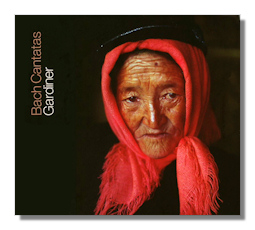
Volume 4
- Cantatas for the Sixth Sunday after Trinity
- Es ist das Heil uns kommen her, BWV 9
- Vergnügte Ruh, beliebte Seelenlust, BWV 170
- Motet "Der Gerechte kommt um"
- Cantatas for the Seventh Sunday after Trinity
- Ärgre dich, o Seele, nicht, BWV 186
- Was willst du dich betrüben, BWV 107
- Es wartet alles auf dich, BWV 187
Katharine Fuge & Joanne Lunn, sopranos
Michael Chance & Richard Wyn Roberts, countertenors
James Gilchrist & Kobie van Rensburg, tenors
Stephan Loges & Stephen Varcoe, baritones
Monteverdi Choir
English Baroque Soloists/John Eliot Gardiner
Soli Deo Gloria SDG156 2CDs

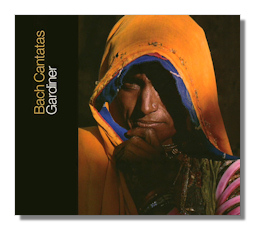
Volume 5
- Cantatas for the Eighth Sunday after Trinity
- Wo Gott der Herr nicht bei uns hält, BWV 178
- Erforsche mich, Gott, und erfahre mein Herz, BWV 136
- Es ist dir gesagt, Mensch, was gut ist, BWV 45
- Cantatas for the Tenth Sunday after Trinity
- Schauet doch und sehet, ob irgendein Schmerz sei, BWV 46
- Nimm von uns Herr, du treuer Gott, BWV 101
- Herr, deine Augen sehen nach dem Glauben!, BWV 102
Joanne Lunn, soprano
Daniel Taylor, countertenor
Robin Tyson, alto
Christoph Genz, tenor
Gotthold Schwarz & Brindley Sherratt, basses
Monteverdi Choir
English Baroque Soloists/John Eliot Gardiner
Soli Deo Gloria SDG147 2CDs

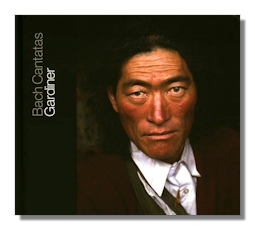
Volume 9
- Cantatas for the for the Seventeenth Sunday after Trinity
- Bringet dem Herrn Ehre seines Namens, BWV 148
- Ach, lieben Christen, seid getrost, BWV 114
- Wer sich selbst erhöhet, der soll erniedriget werden, BWV 47
- Motet "Der Geist hilft unser Schwachheit auf", BWV 226
- Cantatas for the Eighteenth Sunday after Trinity
- Herr Christ, der ein'ge Gottessohn, BWV 96
- Gott soll allein mein Herze haben, BWV 169
- Du Friedefürst, Herr Jesu Christ, BWV 116
- Chorale: Vor deinen Thron tret' ich hiermit, BWV 668
Katharine Fuge, soprano
Charles Humphries, countertenor
Frances Bourne, mezzo-soprano
Nathalie Stutzmann & Robin Tyson, altos
Christoph Genz & Mark Padmore, tenors
Stephan Loges, baritone
Gotthold Schwarz, bass
Monteverdi Choir
English Baroque Soloists/John Eliot Gardiner
Soli Deo Gloria SDG159 2CDs

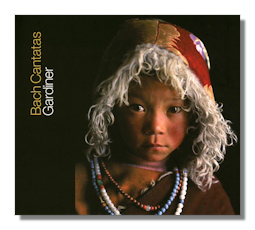
Volume 14
- Cantatas for Christmas Day and for the Second Day of Christmas
- Gelobet seist du, Jesu Christ, BWV 91
- Christum wir sollen loben schon, BWV 121
- Dazu ist erschienen der Sohn Gottes, BWV 40
- Unser Mund sei voll Lachens, BWV 110
Katharine Fuge & Joanne Lunn, soprano
William Towers, countertenor
Robin Tyson, alto
James Gilchrist, tenor
Peter Harvey, bass
Monteverdi Choir
English Baroque Soloists/John Eliot Gardiner
Soli Deo Gloria SDG113


Volume 16
- Motet "Singet dem Herrn ein neues Lied", BWV 225
- Cantatas for Sunday after Christmas Day
- Tritt auf die Glaubensbahn, BWV 152
- Das neugeborne Kindelein, BWV 122
- Gottlob! nun geht das Jahr zu Ende, BWV 28
- Cantata for New Year's Day
- Singet dem Herrn ein neues Lied!, BWV 190
Katharine Fuge, Gillian Keith & Joanne Lunn, sopranos
Daniel Taylor, countertenor
James Gilchrist, tenor
Peter Harvey, bass
Monteverdi Choir
English Baroque Soloists/John Eliot Gardiner
Soli Deo Gloria SDG137

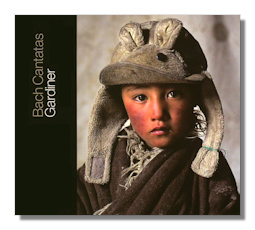
Volume 17
- Cantatas for New Year's Day
- Lobe den Herrn, meine Seele II, BWV 143
- Jesu, nun sei gepreiset, BWV 41
- Herr Gott, dich loben wir, BWV 16
- Gott, wie dein Name, so ist auch dein Ruhm, BWV 171
- Cantatas for the Sunday after New Year
- Schau, lieber Gott, wie meine Feind, BWV 153
- Ach Gott, wie manches Herzeleid II, BWV 58
Ruth Holton, soprano
Charles Humphries, countertenor
Lucy Ballard, alto
Sally Bruce Payne, mezzo-soprano
James Gilchrist, tenor
Peter Harvey, bass
Monteverdi Choir
English Baroque Soloists/John Eliot Gardiner
Soli Deo Gloria SDG150 2CDs

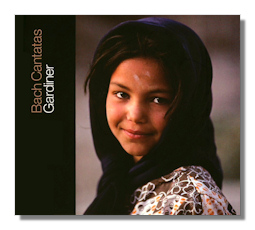
Volume 20
- Cantatas for Septuagesima
- Nimm, was dein ist, und gehe hin, BWV 144
- Ich bin vergnügt mit meinem Glücke, BWV 84
- Ich hab in Gottes Herz und Sinn, BWV 92
- Cantatas for Sexagesima
- Gleichwie der Regen und Schnee vom Himmel fällt, BWV 18
- Leichtgesinnte Flattergeister, BWV 181
- Erhalt uns, Herr, bei deinem Wort, BWV 126
Angharad Gruffydd Jones, Gillian Keith & Miah Persson, sopranos
Wilke te Brummelstroete & Robin Tyson, altos
James Gilchrist & James Oxley, tenors
Stephan Loges, baritone
Jonathan Brown, bass
Monteverdi Choir
English Baroque Soloists/John Eliot Gardiner
Soli Deo Gloria SDG153 2CDs


Volume 25
- Cantatas for the Fifth Sunday after Easter
- Wahrlich, wahrlich, ich sage euch, BWV 86
- Bisher habt ihr nichts gebeten in meinem Namen, BWV 87
- In allen meinen Taten, BWV 97
- Cantatas for the Sunday after Ascension Day
- Sie werden euch in den Bann tun I, BWV 44
- Nach dir, Herr, verlanget mich, BWV 150
- Johann Christoph Friedrich Bach: Motet "Fürchte dich nicht"
Katharine Fuge & Joanne Lunn, sopranos
Daniel Taylor, countertenor
Paul Agnew & Steve Davislim, tenors
Stephan Loges, baritone
Panajotis Iconomou, bass
Monteverdi Choir
English Baroque Soloists/John Eliot Gardiner
Soli Deo Gloria SDG144 2CDs

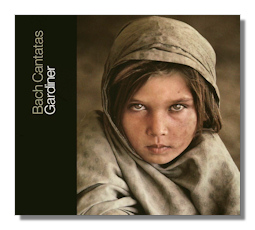
Volume 27
- Brandenburg Concerto #3, BWV 1048
- Cantatas for Whit Tuesday
- Erwünschtes Freudenlicht, BWV 184
- Er rufet seinen Schafen mit Namen, BWV 175
- Cantatas for Trinity Sunday
- Höchsterwünschtes Freudenfest, BWV 194
- Es ist ein trotzig und verzagt Ding, BWV 176
- O heil'ges Geist und Wasserbad, BWV 165
- Gelobet sei der Herr, mein Gott, BWV 129
Ruth Holton & Lisa Larsson, sopranos
Daniel Taylor, countertenor
Nathalie Stutzmann, alto
Paul Agnew & Christoph Genz, tenors
Stephan Loges, baritone
Peter Harvey, bass
Monteverdi Choir
English Baroque Soloists/John Eliot Gardiner
Soli Deo Gloria SDG138 2CDs
There are three cycles of the Bach cantatas at various stages of completion: that on Bis by Masaaki Suzuki with the Bach Collegium Japan and soloists; it has one significant advantage over the other two: some of its releases are in SACD format, although each CD set comes with fewer works on it. On Challenge is the now complete cycle with by Ton Koopman with the Amsterdam Baroque Orchestra, Amsterdam Baroque Choir and soloists. A comparative review of this cycle was published here in 2007. Thirdly, there is the cycle of recordings, whose release is now nearing completion, made by John Eliot Gardiner on his highly-publicized "Bach Cantata Pilgrimage" in 2000. It was originally a project supported by Deutsche Grammophon. They pulled out before it really got underway, so Gardiner formed his own label, Soli Deo Gloria Records (SDG), to complete the project. All two dozen or so CD sets will soon be available on SDG. The cycle uses The Monteverdi Choir, The English Baroque Soloists and a highly creditable bevy of soloists. The SDG and Challenge cycles distribute the cantatas across comparable numbers of CDs, although the numbering of Gardiner's cycle is not incremental: the sequence reflects the occasion in the church year for which the cantatas were written. Each cantata was performed (and recorded) on the feast day for which it was originally composed (or refashioned). As Gardiner acknowledges, "…when we embarked on the Bach Cantata Pilgrimage in Weimar on Christmas Day 1999 we had no real sense of how the project would turn out." There had to be considerable adapting and changing of plans for nothing like it had been attempted before.
Recent reviews of individual CD sets have appeared recently on Classical Net (SDG165 and SDG162). Individual releases as the set nears completion will, of course, continue to appear on the site. But it seemed appropriate to stand back and take a look at the overall achievement of Gardiner and his forces. So this month we present an assessment of the ten other most recent releases in the cycle: Volumes 3, 4, 5, 9, 14, 16, 17 20, 25 and 27; these contain cantatas mostly written for the Trinity and Christmas seasons.
One of the first things that strikes one listening repeatedly to these performances is their consistency. They were all conceived for, set up, rehearsed and committed to record "on-the-go". In multiple different locations, each with a different acoustic and with varied facilities available. Yet Gardiner's sense of Bach's achievement, his persuasive and compelling account of how the cantatas should sound to our ears, how much that can or should reflect performance practice from the early and mid eighteenth century, is acute and compelling. It adds immeasurably to our appreciation of the cantata as a work in Bach's hands. It's a great tribute to Gardiner's musicianship (and experience) that one could in theory pick out any CD from these latest ten (or any other, for that matter) and feel as centered in one's response to this aspect of Bach's liturgical world as with any of the CDs in the cycle.
A clear (though obliquely referenced) motive for performing and recording the corpus this way was as homage to the way in which Bach himself had to work: after the Sunday performance of one week he had but a couple of days in which to compose the cantata for the next. Arrangements and parts were sometimes still being prepared right up to and during rehearsals on the Friday and Saturday preceding that next Sunday. Some of Gardiner's schedule was not that different from this apparently rough pace. Although his personnel and churches, not to mention the weather, travel and the immensity of practical arrangements (accommodation, recording equipment, instruments etc) were complexities with which Bach did not have to cope. That out of this logistical, geographical and organizational maze came any recordings at all – let alone recordings of such beauty and appeal – is quite a wonder. As Gardiner writes, "Nor did we have the luxury of repeated performances in which to try out various solutions: at the end of each feast-day we had to put the outgoing trio or quartet of cantatas to the back of our minds and move on the next clutch – which came at us thick and fast at peak periods such as Whitsun, Christmas and Easter." Significantly, though, the listener is nevertheless less struck by the sense of a series of events than by the music. That's as it should be, but wasn't by any means a foregone conclusion. One supposes that only when musicians of this caliber are involved is such a superb outcome even remotely likely. That music-making of such consistently high quality as this, that singers' particular preferences of style and success at melding with the rest of the project have worked so well does great credit to all involved – including the engineers and support staff.
Another characteristic of Gardiner's approach is brilliance: neither Koopman's nor Suzuki's sound is dull. Nor do they lack vibrancy. But Gardiner's clarity and determination to give every bar, every word, its due – and more – is exemplary. Not that such concentration on the components of the music is in any way forensic or over-analytical. Because, as each cantata progresses, you're aware of Gardiner's understanding and appreciation of its entirety. It's tempting to relate this forwardness and lucidity to the ways in which the cantatas' first performers may have (had to) approach them. These singers and players may well have much more polish than those of Bach's day, one presumes. But it's not a polish of an otherwise matt surface. Rather, a light shone into a crystal such that its many facets, shades, colors and depths are illuminated anew at each listening. Note, by the way, that singers on these recordings are not one-to-a-part.
For consistency's sake a pitch of A=415' was chosen for all the recordings. As a result, those composed in Weimar at a higher pitch were performed in the revised transpositions that Bach himself prepared for actual or planned performance in Leipzig. The edition used for the cantatas is that commissioned specially from Reinhold Kubik. Even so, Gardiner and his musicians had to take decisions on instrumentation, pitch, bass figuration and voice types, for example. By and large the acoustic is good and roomy. In the actual sound on the CDs, though, there are signs of perhaps the compromises necessary for recordings on the move: perceptible acoustic distortion in places. Not enough to spoil your pleasure. But there at odd moments nevertheless. The CDs come in sets of mostly twos. Volume 14 (SDG113) and Volume 16 (SDG137) are the exceptions in this batch – single CDs. In all cases the presentation is excellent, though one worries that the cardboard "sleeves" bound into the booklet packs may sooner or later scratch the CDs' surfaces. The printed material that comes in all cases is thorough. There is an essay on the project that's reproduced in each booklet; these add to our appreciation of the achievement without overplaying it… insight not incitement to praise. Then lengthy and highly perceptive descriptions of each work give background, performing challenges and some personal responses. The texts are all printed in German with good English translations. Biographies and photographs of the performers complete the content, which is all white text on a black background.
There can be no one "best choice" of Bach cantata cycle. The weaknesses of none of the three are anywhere near significant enough to rule it out. Nor its strengths great enough to suggest that it's the only one to consider. Honors for soloists are even among both Koopman and Gardiner. For orchestral playing include Suzuki as well. The latter is probably the least even achievement. But an achievement it nevertheless is. The greatest drawback for Gardiner's series is perhaps one of perception: of a larger-than-life figure like Gardiner attempting the impossible and having to overcome unfair odds. It's wise to see right past this and concentrate on the music rather than the "pilgrimage". Then it becomes clear just what an immense service he has done to the music. Profundity, perspicacity, precision draw attention not to themselves but to Bach. That says it all. Strongly recommended.
Copyright © 2010, Mark Sealey.





















